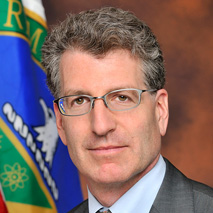Coal remains an important part of the nation’s all-of-the-above energy strategy and advanced fossil energy technologies will play a large role. The Department is working with the industry to support those innovative technologies from the lab to comme...
Office of Energy Dominance Financing
August 21, 2014This week I delivered a keynote address at Coal-Gen, an annual conference of more than 2,000 coal industry professionals. I shared an experience not from my time at the Department of Energy, but rather from my time as an entrepreneur in the media industry.
From the time I worked in print and broadcast media to today, I have witnessed the Internet and digital devices shift the way people get their news. The outlets that are innovating and embracing digital news are the ones succeeding today despite the change in their business environment.
Currently, the energy industry and in particular, coal, is experiencing a similarly major shift in industry dynamics to what the newspaper industry faced. A decade ago, coal was by far the largest fuel source for electricity in the United States. But in the past decade, cleaner energy sources like natural gas, wind and solar have become more abundant as costs have declined and concerns about greenhouse gas emissions have grown.
Still, coal remains an important part of the nation’s all-of-the-above energy strategy and advanced fossil energy technologies will play a large role. The Department is working with the industry to support those innovative technologies from the lab to commercial scale.
The National Energy Technology Laboratory (NETL) works in public-private partnership to support research and demonstration of early-stage technologies. For example, its partnership with Great River Energy is helping to increase operating efficiencies and reduce the emission of pollutants at the company’s Coal Creek Station in North Dakota using a new fuel enhancement system.
The Department’s Office of Fossil Energy is supporting nearly $10 billion worth of demonstration projects to demonstrate large-scale integrated carbon capture, utilization and storage (CCUS) projects in a number of industries, using a number of different technologies CCUS at scale and to provide data, knowledge, and experience.
The Department is also helping technologies as they move from demonstration to commercial scale. Just last month, the Department announced that it is partnering with NRG Energy and JX Nippon to construct the Petra Nova Project in Houston, Texas. The $469 million project will be the first U.S. commercial-scale post-combustion CCS retrofit and the largest in the world. It is expected to annually capture 1.4 million metric tons of carbon dioxide from 240 MW of generation.
For those technologies that are on the edge of widespread commercial deployment, the Department’s Loan Programs Office (LPO) is poised to help by providing loan guarantees. In December, LPO announced an $8 billion Advanced Fossil Energy Projects solicitation that can help the coal industry finance projects that avoid, reduce, or sequester greenhouse gases. The solicitation is applicable to projects along the entire fossil fuel value chain, including anything from extraction to generation to greenhouse gas removal to efficiency improvements.
Whether it’s the news or the coal industry, innovation is the key to future success. Loan guarantees can be an important financing tool for the innovations that will help the coal industry be an important part of the nation’s energy mix into the future.


